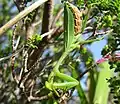| African mantis | |
|---|---|
_(14051620003).jpg.webp) | |
| Adult in the Kruger Park, South Africa | |
| Scientific classification | |
| Domain: | Eukaryota |
| Kingdom: | Animalia |
| Phylum: | Arthropoda |
| Class: | Insecta |
| Order: | Mantodea |
| Family: | Mantidae |
| Genus: | Sphodromantis |
| Species: | S. gastrica |
| Binomial name | |
| Sphodromantis gastrica (Stål, 1858) | |
| Synonyms | |
| |
Sphodromantis gastrica, with the common names African mantis or common green mantis, is a species of praying mantis from Africa.[1][2][3]
It averages 65–75 millimetres (2.6–3.0 in) in body length, and has a very diverse diet, hunting any prey of reasonable size.[4] It has a lifespan of approximately 332 days and usually females live longer than males. Their survival rate until adulthood is about 41.8%.[5]
Previously classified as Hierodula bicarinata (Saussure, 1869) and as Sphodromantis guttata (Giglio-Tos, 1907), this species has been found in South Africa, Namibia, Botswana, Zimbabwe, Zambia, Democratic Republic of Congo, and East Africa.[6][7]
 Dorsal aspect of a late instar female, showing wing-pads
Dorsal aspect of a late instar female, showing wing-pads.jpg.webp) Immature female
Immature female Sphodromantis eating bee
Sphodromantis eating bee
See also
References
- ↑ "Archived copy". Archived from the original on 2009-03-30. Retrieved 2008-07-22.
{{cite web}}: CS1 maint: archived copy as title (link) African Mantis - ↑ African Praying Mantis
- ↑ "Untitled Document". Archived from the original on 2009-09-16. Retrieved 2008-07-23. African Praying Mantis Sphodromantis gastrica, lineola, viridis and centralis
- ↑ Kudlanky.com
- ↑ Greyvenstein, Bianca; Du Plessis, Hannalene; Van den Berg, Johnnie (2022-11-01). "Notes on the lifecycle and distribution of Sphodromantis gastrica (Stål, 1858) (Mantodea: Mantidae) in South Africa". African Entomology. 30. doi:10.17159/2254-8854/2022/a13967. ISSN 2224-8854.
- ↑ "Checklist: South African Praying Mantises (Mantodea: Mantidae)". Archived from the original on 2008-06-22. Retrieved 2008-07-23. The Praying Mantises (Mantodea: Mantidae) of South Africa compiled by Alfred P. Kaltenbach, Naturhistorisches Museum in Wien, Burgring 7, A-1014 Wien, Austria
- ↑ "Working with Biodiversity - A Natural History of Tioxide". Archived from the original on 2010-09-03. Retrieved 2010-06-22. Working with Biodiversity - A Natural History of Tioxide
This article is issued from Wikipedia. The text is licensed under Creative Commons - Attribution - Sharealike. Additional terms may apply for the media files.